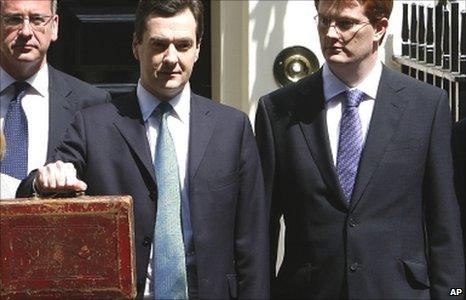Wales braced for George Osborne's first Budget
- Published

Chancellor George Osborne holds his Budget Box, with Chief Secretary to the Treasury Danny Alexander [R] outside 11 Downing Street
Wales is braced for a Budget of tax rises and spending cuts to help tackle the UK's deficit.
Chancellor George Osborne is unveiling what he called a "tough but fair" package to reduce the deficit.
Business leaders in Wales warned against tax hikes and cuts that could lead to a "double dip" recession.
Opposition parties claimed the proposed cuts were "savage", would hit the poorest in society and cost thousands of lost jobs.
Unions voiced fears of a return to the early 1980s unless Wales was allowed to make tentative steps towards recovery.
Mr Osborne is outlining his first Budget, billed as an economic formula not just for the financial year but for the next four years, with its success linked to the survival of the new coalition government.
He has said it will set out necessary plans to bring down borrowing over the next four years and how this will be divided up between spending cuts and tax rises.
In Wales, where last year 30.5% of workers were employed by the public sector and cuts of 20-30% are anticipated, there is apprehension among both large and small businesses.
David Rosser, director of CBI Wales, urged no further taxes on businesses.
Mr Rosser said: "If the chancellor puts up taxes on business today it will hit investment intentions and companies will withdraw into their shells. Similarly if spending cuts are on capital investment that will have an impact.
"There's no need for us to head into a double dip recession - this isn't going to be easy. We've always been forecasting a slow recovery and that's still our best bet."
He warned raising VAT was a cost most retailers would struggle to absorb and the increases would then be passed on to the public which would affect families' spending power.
Lord Howe of Aberavon, who as Geoffrey Howe was chancellor under Margaret Thatcher, compared the background to Mr Osborne's budget with that before his own budget of 1981 which followed the recession of 1979.
"The situation now is far more difficult than it was in 1981," he told Βι¶ΉΤΌΕΔ Radio Wales.
"The size of the national debt is infinitely larger. [Mr Osborne] has no option whatsoever but to impose a very very difficult budget, far greater than mine.
David Rosser, of CBI Wales, has warned against more taxes on firms
"Mine if I may say so involved increasing every form of taxation except value added tax... but he has much less room for manoeuvre than I had.
"He's got a very tough task. Inevitably everyone has got to face some kind of sacrifice."
Paul O'Shea, Welsh secretary of the union Unison, said: "We could even be facing a return to the bad old days when the mines shut and steel works closed and if that happens the economy will fall off a precipice.
"Everybody appreciates we've got a big debt to repay but there is a need to be sensible. If the chancellor and the prime minister are serious about us all being in it together, the budget needs to reflect that."
Most businesses fear hikes in VAT, capital gains tax and corporation tax, while growth remains slower than predicted.
World recession
Mr O'Shea said Unison would be advising against industrial action in sectors worst hit and would work with the assembly government to protect jobs and services.
He said: "A quarter of the Welsh workforce are in the public sector and a significant number have children and will be low-paid.
"If there is a tax on things like child benefits people face the risk of losing their jobs in places like Blaenau Gwent and Merthyr which are already suffering from high unemployment."
Dr Charles Smith, senior lecturer in economics and education at Swansea Metropolitan University, warned a double dip recession would follow.
"Nothing can be done locally to protect Welsh jobs. Those powers are not devolved to Wales to increase or reduce taxes," he said.
"The only way to avoid it is don't be old, don't be unemployed and don't get ill."
Peter Hain, Labour's former Welsh secretary, described the government's proposed cutbacks as "savage" and said they would cost 50,000 jobs in Wales.
"They are both cutting too soon and they are cutting far too deeply," he said.
"What is damaging about this is that it will stall the recovery. Thousands and thousands of people are going to lose their jobs in Wales as a result of this budget."
Jonathan Edwards, Plaid Cymru Treasury spokesman and MP for Carmarthen East and Dinefwr, said the poorest people in society were going to be hit.
"Deficit reduction is not only about cutting expenditure," he said. "It's an optimal balance between cutting expenditure and raising income. But most importantly it's sustained economic growth.
"The sort of cuts that are being mentioned in the press in the last few days are likely to drive our economies into a double-dip recession - if not at macro level then definitely at Welsh level and the end result of that could definitely be the deficit increasing."
- Published21 June 2010
- Published21 June 2010
- Published20 June 2010